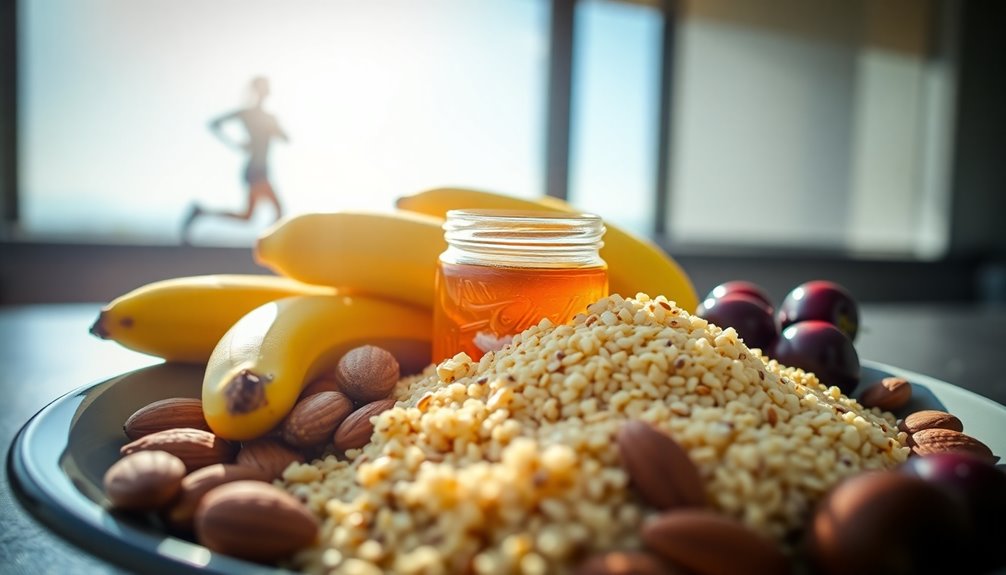To fuel your endurance runs, prioritize carbohydrates as your main energy source, aiming for 2.7 to 4.5 grams per pound of body weight during training. Don't forget protein for recovery—consume 20-30 grams post-run. Include healthy fats for sustained energy, especially during longer runs. Hydration is key; sip fluids before, during, and after your workouts. Tailor your nutrition plan to your unique needs so you can optimize performance and recovery. There's more to uncover about enhancing your endurance nutrition.
Key Takeaways
- Prioritize carbohydrates as your main fuel source, aiming for 2.7 to 4.5 grams per pound of body weight during training.
- Include protein in your post-run recovery, consuming 0.6 to 0.8 grams per pound within 30-60 minutes after running.
- Incorporate healthy fats into your diet to provide sustained energy for runs lasting over 90 minutes.
- Stay hydrated by drinking 16-24 ounces of fluids 1-2 hours before running and ½-1 liter per hour during longer runs.
- Tailor your nutrition plan to individual needs, ensuring carbohydrates make up 45-65% of your total caloric intake.
Understanding the Role of Carbohydrates in Endurance Running

When you're preparing for endurance runs, understanding the essential role carbohydrates play in your performance is important. Carbohydrates are your primary fuel source, providing around 4 calories per gram.
To optimize your muscle glycogen storage, aim for 2.7 to 4.5 grams of carbohydrates per pound of body weight daily, especially during intense training.
Before a race, consume 100-150 grams of easily digestible carbohydrates 2-3 hours prior to guarantee you have enough energy.
During races lasting over 60-90 minutes, aim for 30-60 grams of carbohydrates per hour from sources like energy gels or sports drinks.
Finally, post-race, replenish glycogen stores with 50-100 grams of carbohydrates within 30-60 minutes to support recovery and maintain your performance for future runs. Additionally, understanding your budget for nutrition can help you invest in quality food options that fuel your body effectively.
The Importance of Protein for Recovery and Muscle Maintenance

After a long run, your muscles need protein to recover and maintain their strength.
Aiming for high-quality sources and timing your intake can make a big difference in your recovery process.
Let's explore how protein supports your body and the best ways to incorporate it into your routine. Additionally, incorporating chia seeds' complete protein can enhance your protein intake while providing essential nutrients for recovery.
Protein's Role in Recovery
Though many runners focus on carbohydrates for energy, protein plays an essential role in recovery and muscle maintenance after endurance runs. For endurance athletes, consuming the right amount of protein is vital for effective muscle recovery. Aim for 0.6 to 0.8 grams of protein per pound of body weight, especially after your runs.
| Protein Intake | Timing | Benefits |
|---|---|---|
| 20-30 grams | Within 30-60 minutes post-run | Replenishes glycogen, aids muscle repair |
| Up to 5 grams/hour | During long training sessions | Enhances performance, reduces hunger |
| Lean meats, dairy, beans, nuts | Throughout the day | Supports muscle mass development and recovery |
Incorporating protein into your post-run routine helps mitigate muscle soreness and keeps your training schedule on track. Additionally, awareness of nutrition strategies can further enhance your overall performance and recovery process.
Optimal Protein Sources
Choosing the right protein sources is essential for your recovery and muscle maintenance after endurance runs. Ideal protein sources include lean meats, eggs, dairy products, and plant-based options like beans and nuts. These foods provide the high-quality protein you need for muscle repair.
Aim for a protein intake of 0.6 to 0.8 grams per pound of your body weight, which translates to about 81 to 108 grams for a 135-pound runner. Consuming 10-20 grams of protein within 30-60 minutes post-run can greatly enhance your recovery by replenishing muscle glycogen and reducing soreness. Incorporating high-quality protein sources into your balanced diet won't only support muscle maintenance but also improve your overall performance during high mileage training cycles.
Timing Protein Intake
Timing your protein intake is essential for optimal recovery and muscle maintenance after endurance runs. For best results, you should aim for 0.6 to 0.8 grams of protein per pound of body weight daily. Consuming 10-20 grams of high-quality protein within 30-60 minutes post-run is vital for muscle recovery. Additionally, incorporating anti-inflammatory foods in your diet can further support recovery and overall performance.
| Timing | Recommended Amount | Purpose |
|---|---|---|
| 2-3 hours pre-run | 10-20 grams | Maintain muscle function |
| 30-60 minutes post-run | 10-20 grams | Muscle recovery & glycogen |
| During runs (4+ hours) | Up to 5 grams/hour | Enhance performance & reduce hunger |
Healthy Fats: Supporting Long-Term Energy Needs

Incorporating healthy fats into your diet can greatly enhance your endurance runs, especially during those longer sessions that last over 90 minutes. These fats serve as a concentrated energy source, perfectly suited to meet your energy demands during extended training.
Unlike carbohydrates, which burn quickly, healthy fats provide sustained fuel, helping you maintain ideal energy levels throughout your run.
Sources like nuts, seeds, avocados, olive oil, and fatty fish not only support your overall health but also aid in the absorption of essential fat-soluble vitamins like A, D, E, and K. Additionally, meal replacement juices can complement your diet by providing essential nutrients while aiding in hydration.
While there aren't specific recommendations for fat intake, consistently including healthy fats in your meals is essential for supporting your long-term energy needs and maximizing performance.
Hydration Strategies for Optimal Performance

To perform at your best during endurance runs, mastering hydration timing techniques is essential.
You'll also need to pay attention to your electrolyte balance and customize your hydration plan based on your individual needs. Additionally, understanding electrolyte balance can greatly enhance your endurance and recovery.
Hydration Timing Techniques
While proper hydration is essential for optimizing your endurance runs, knowing when to hydrate can make all the difference in your performance.
Start by developing a hydration plan that includes sipping 16-24 ounces of fluids and electrolytes 1-2 hours before you hit the trail. During runs lasting over 45 minutes, aim for ½-1 liter (about 20-24 ounces) of fluid each hour to meet your hydration needs.
Keep an eye on your urine color; pale yellow indicates adequate hydration, while darker shades signal you need more fluids. After your run, replenish lost fluids by drinking roughly 20 ounces for every pound you've lost.
Adjust your intake based on your individual sweat rates and the environmental conditions.
Electrolyte Balance Importance
Electrolyte balance plays a significant role in your endurance performance, as even slight imbalances can lead to muscle cramps, fatigue, and decreased stamina.
Essential electrolytes like sodium, potassium, magnesium, and calcium are important for your body during long runs. Make sure to sip on 16-24 ounces of electrolyte drinks 1-2 hours before your event to kickstart hydration and maintain proper levels.
During prolonged activities lasting over an hour, aim for ½-1 liter (20-24 ounces) of fluid per hour to keep your hydration in check. Monitor your urine color; it's a reliable indicator of your hydration status.
After the race, if you've lost over 2% of your pre-workout weight, gradually replenish fluids—about 20 ounces for each pound lost. Additionally, consider incorporating natural remedies that may support hydration and recovery during your training.
Customizing Hydration Plans
Customizing your hydration plan is essential for maximizing endurance performance, especially since every runner’s needs differ. Start by developing a personalized hydration strategy based on your sweat rate, environmental conditions, and pacing. Aim for a fluid intake of 200-1,000 ml per hour. Monitor your urine color; pale yellow indicates proper hydration. Incorporate electrolytes, targeting 200-500 mg of sodium per 20-24 ounce bottle to prevent cramps. Begin hydrating before your race with 16-24 ounces of fluid 1-2 hours prior, and adjust based on real-time feedback. Understanding your energy efficiency ratings can also help you optimize your overall performance during endurance runs. Additionally, practice your hydration plan during training runs to ensure your body adapts properly, allowing you to fine-tune as necessary. Monitoring how different fluid intakes affect your performance can also aid in lowering heart rate while running, promoting better endurance and efficiency. Finally, remember that staying hydrated is not just about the quantity of fluids consumed but also their timing and composition, as this can significantly impact your overall stamina and performance on race day.
| Sweat Rate | Fluid Intake | Electrolytes Needed |
|---|---|---|
| Low | 200-400 ml | 200 mg |
| Moderate | 400-700 ml | 300 mg |
| High | 700-1,000 ml | 500 mg |
Pre-, During-, and Post-Run Nutrition Guidelines

To perform at your best during endurance runs, attention to nutrition before, during, and after your workout is essential.
Consume a pre-run meal 2-4 hours prior, focusing on 200-300 grams of carbohydrates and 30 grams of lean protein to optimize energy.
During runs longer than 60-90 minutes, aim for 30-60 grams of carbohydrates per hour, using energy gels or bananas to maintain energy levels.
After your run, replenish glycogen stores by eating carbohydrates within 30-60 minutes, along with 20-30 grams of high-quality protein for effective recovery.
Don't forget hydration; sip on 16-24 ounces before your run and drink ½-1 liter per hour during.
Proper hydration guarantees you recover well and feel your best on future runs. Additionally, consider incorporating fiber-rich foods into your diet to support overall digestive health and energy levels.
Tailoring Your Nutrition Plan for Individual Needs

When you're training for endurance runs, it's crucial to customize your nutrition plan to meet your unique needs. Carbohydrates should make up 45-65% of your caloric intake, ensuring ideal glycogen storage for endurance performance. Aim for 2.7 to 4.5 grams of carbs per pound of body weight during intense training. Personalize your protein intake as well, targeting 0.6 to 0.8 grams per pound to aid muscle repair. Don't forget hydration—aim for ½-1 liter of fluid per hour, adjusted for sweat rates. Utilizing nutrition tracking apps can help you stay on track with your goals.
| Macronutrient | Recommendation | Importance |
|---|---|---|
| Carbohydrates | 45-65% of caloric intake | Fuels endurance performance |
| Protein | 0.6-0.8 grams/pound | Supports muscle recovery |
| Hydration | ½-1 liter/hour | Prevents dehydration during runs |
Frequently Asked Questions
What Foods Are Good for Fuel a Long Run?
To fuel a long run, focus on easy-to-digest carbohydrates. Foods like oatmeal, bananas, and energy gels are great options.
You should aim for 100-150 grams of carbs about 2-3 hours before hitting the road. During your run, consider snacking on gels or sports drinks to maintain energy levels.
Afterward, replenish with a meal containing carbohydrates and protein, like a smoothie or grilled chicken with quinoa, to aid recovery and muscle repair.
What Foods Would You Consume to Help Fuel Endurance Exercises?
To fuel endurance exercises, you'll want to focus on carbohydrate-rich foods like whole grains, fruits, and starchy vegetables.
Before your workout, eat a meal with 200-300 grams of carbs and about 30 grams of lean protein.
During longer sessions, snack on energy gels or bananas to maintain your energy.
Afterward, replenish with 20-30 grams of protein and 50-100 grams of carbs to support muscle recovery and restore your energy levels.
What Is the Best Fuel for Endurance Running?
The best fuel for endurance running is carbohydrates. They provide the energy your body needs to perform over long distances.
You should aim for about 2.7 to 4.5 grams of carbs per pound of your body weight daily, adjusting based on how intensely you train.
During runs longer than 60-90 minutes, consuming 30-60 grams of carbs each hour can help keep your energy levels steady and prevent fatigue.
Don't forget about post-run recovery!
How Do You Fuel During Endurance Events?
During endurance events, you need to fuel your body effectively to maintain energy levels. Aim for 30-60 grams of carbohydrates each hour, using options like energy gels or bananas.
Stay hydrated by drinking ½-1 liter of fluids per hour, adjusting for your sweat rate. If you're running for over four hours, consider adding protein to your intake.
Keep an eye on your electrolyte balance to prevent cramps and guarantee peak performance.
Conclusion
Fueling your endurance runs isn't just about snacking on energy bars; it's a carefully crafted recipe for success. Think of your body as a high-performance engine—without the right fuel, it'll sputter and stall. By prioritizing carbohydrates, protein, and healthy fats, along with staying hydrated, you can release your potential. Remember, tailoring your nutrition plan to your unique needs is like customizing a race strategy; it can make all the difference on race day!









